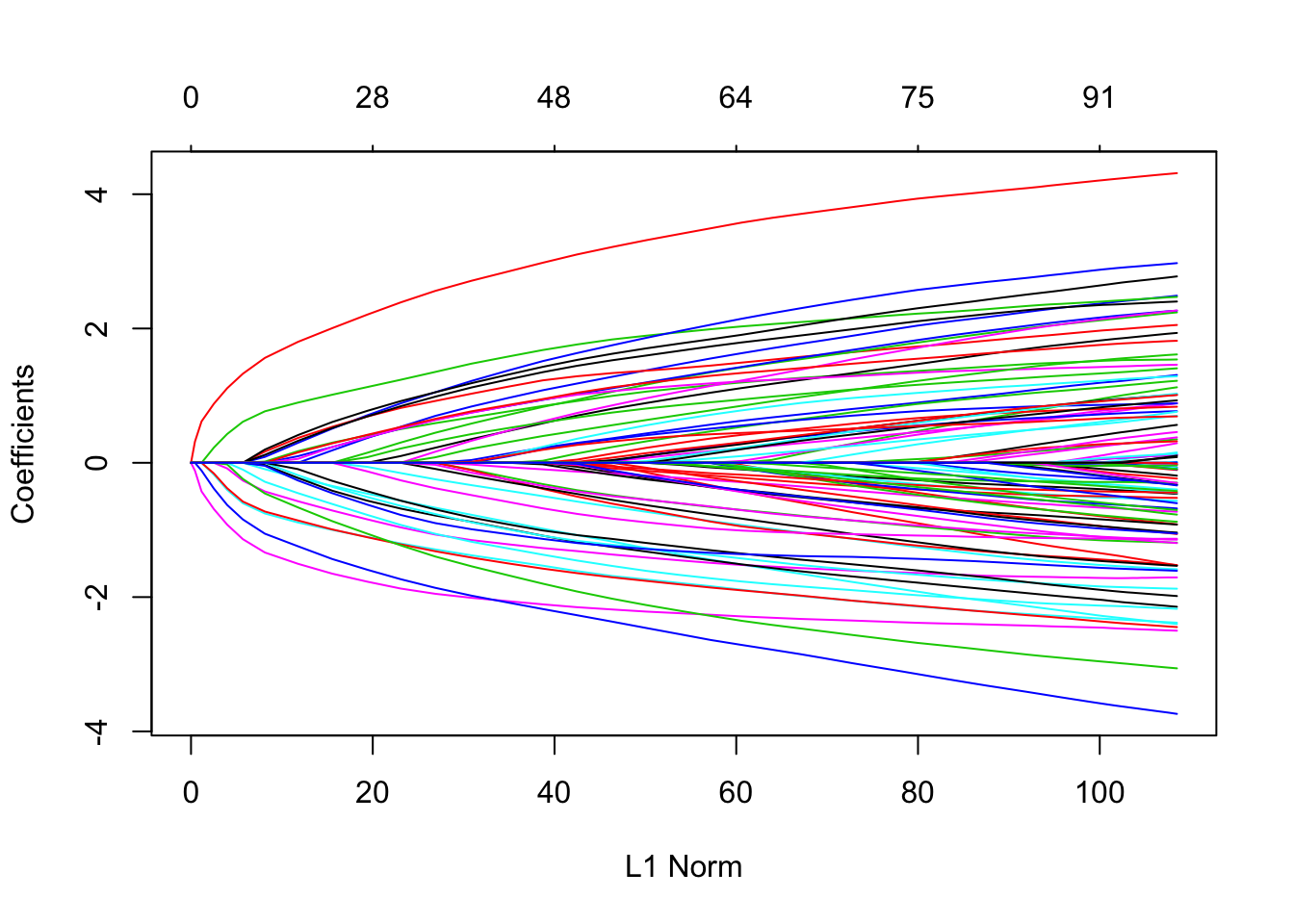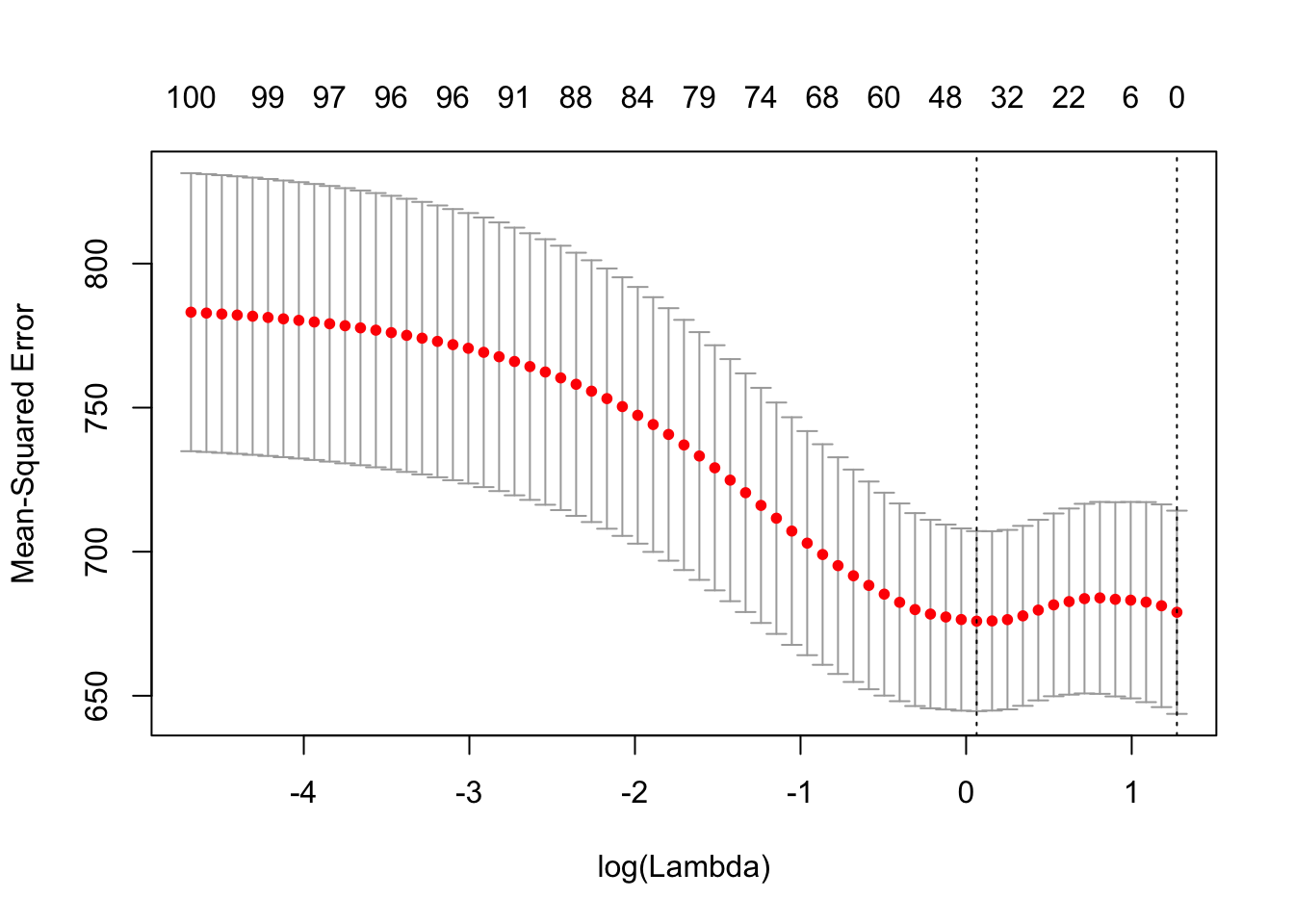simple simulation for glmnet
Matthew Stephens
April 5, 2018
Last updated: 2018-05-21
workflowr checks: (Click a bullet for more information)-
✔ R Markdown file: up-to-date
Great! Since the R Markdown file has been committed to the Git repository, you know the exact version of the code that produced these results.
-
✔ Environment: empty
Great job! The global environment was empty. Objects defined in the global environment can affect the analysis in your R Markdown file in unknown ways. For reproduciblity it’s best to always run the code in an empty environment.
-
✔ Seed:
set.seed(20180411)The command
set.seed(20180411)was run prior to running the code in the R Markdown file. Setting a seed ensures that any results that rely on randomness, e.g. subsampling or permutations, are reproducible. -
✔ Session information: recorded
Great job! Recording the operating system, R version, and package versions is critical for reproducibility.
-
Great! You are using Git for version control. Tracking code development and connecting the code version to the results is critical for reproducibility. The version displayed above was the version of the Git repository at the time these results were generated.✔ Repository version: b3b09a1
Note that you need to be careful to ensure that all relevant files for the analysis have been committed to Git prior to generating the results (you can usewflow_publishorwflow_git_commit). workflowr only checks the R Markdown file, but you know if there are other scripts or data files that it depends on. Below is the status of the Git repository when the results were generated:
Note that any generated files, e.g. HTML, png, CSS, etc., are not included in this status report because it is ok for generated content to have uncommitted changes.Ignored files: Ignored: .DS_Store Ignored: .Rhistory Ignored: .Rproj.user/ Ignored: .sos/ Ignored: exams/ Ignored: temp/ Untracked files: Untracked: analysis/hmm.Rmd Untracked: analysis/neanderthal.Rmd Untracked: analysis/pca_cell_cycle.Rmd Untracked: analysis/ridge_mle.Rmd Untracked: data/reduced.chr12.90-100.data.txt Untracked: data/reduced.chr12.90-100.snp.txt Untracked: docs/figure/hmm.Rmd/ Untracked: docs/figure/pca_cell_cycle.Rmd/ Untracked: homework/fdr.aux Untracked: homework/fdr.log Untracked: tempETA_1_parBayesC.dat Untracked: temp_ETA_1_parBayesC.dat Untracked: temp_mu.dat Untracked: temp_varE.dat Untracked: tempmu.dat Untracked: tempvarE.dat Unstaged changes: Modified: analysis/cell_cycle.Rmd Modified: analysis/density_est_cell_cycle.Rmd Modified: analysis/eb_vs_soft.Rmd Modified: analysis/eight_schools.Rmd Modified: analysis/svd_zip.Rmd
Expand here to see past versions:
Simulate some data
library(glmnet)Loading required package: MatrixLoading required package: foreachLoaded glmnet 2.0-16set.seed(1)
p = 100
n = 500
X = matrix(rnorm(n*p),ncol=p)
b = rnorm(p)
e = rnorm(n,0,sd=25)
Y = X %*% b + eNow fit ols, ridge regression and lasso, and see some basic plots.
Y.ols = lm(Y~X)
Y.ridge = glmnet(X,Y,alpha=0)
plot(Y.ridge)
Y.lasso = glmnet(X,Y,alpha=1)
plot(Y.lasso)
The library also allows you to run cross-validation easily:
cv.ridge = cv.glmnet(X,Y,alpha=0)
plot(cv.ridge)
cv.lasso = cv.glmnet(X,Y,alpha=1)
plot(cv.lasso)
Measure accuracy of coefficients
Extract coefficients from best cv fits.
b.ridge = predict(Y.ridge, type="coefficients", s = cv.ridge$lambda.min)
b.lasso = predict(Y.lasso, type="coefficients", s = cv.lasso$lambda.min)
b.ols = Y.ols$coefficientsNote that the fits include an intercept (unregularized, equal to the mean of Y).
length(b.lasso)[1] 101b.lasso[1][1] -1.38244mean(Y)[1] -1.233957Compare the estimated coefficients with the truth:
btrue = c(0,b) # Here the 0 is the intercept (true value 0)
sum((btrue-0)^2) # This is error if we just estimate 0 for everything and ignore data. It is better than OLS![1] 85.30411sum((btrue-Y.ols$coefficients)^2)[1] 138.2715sum((btrue-b.ridge)^2)[1] 56.99797sum((btrue-b.lasso)^2)[1] 68.7212Session information
sessionInfo()R version 3.3.2 (2016-10-31)
Platform: x86_64-apple-darwin13.4.0 (64-bit)
Running under: OS X El Capitan 10.11.6
locale:
[1] en_US.UTF-8/en_US.UTF-8/en_US.UTF-8/C/en_US.UTF-8/en_US.UTF-8
attached base packages:
[1] stats graphics grDevices utils datasets methods base
other attached packages:
[1] glmnet_2.0-16 foreach_1.4.4 Matrix_1.2-14
loaded via a namespace (and not attached):
[1] workflowr_1.0.1 Rcpp_0.12.16 codetools_0.2-15
[4] lattice_0.20-35 digest_0.6.15 rprojroot_1.3-2
[7] R.methodsS3_1.7.1 grid_3.3.2 backports_1.1.2
[10] git2r_0.21.0 magrittr_1.5 evaluate_0.10.1
[13] stringi_1.1.7 whisker_0.3-2 R.oo_1.22.0
[16] R.utils_2.6.0 rmarkdown_1.9 iterators_1.0.9
[19] tools_3.3.2 stringr_1.3.0 yaml_2.1.18
[22] htmltools_0.3.6 knitr_1.20 This reproducible R Markdown analysis was created with workflowr 1.0.1